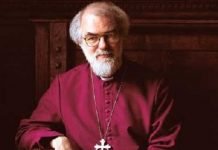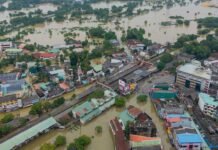Churchgoers and clergy alike are concerned that the pandemic has put the future of their parish churches in doubt, according to research from the University of Warwick and York St John University.
The first national lockdown closed churches across the UK and severely restricted ministry in areas such as pastoral care, fellowship groups, and serving the community. Church services moved online with varying degrees of success.
The Coronavirus, Church & You survey, a major study of the impact of the lockdown on churchgoers, clergy and lay people was conducted online from May to July 2020, and gathered more than 10,000 responses. A second iteration of the survey is currently in progress.
End of the road for fragile churches?
In their paper Impact of Covid-19 on Fragile Churches: Listening to the Voices of Lay People ,published today [14] in Rural Theology, Canon Leslie Francis, Andrew Village, and S. Anne Lawson analyse the results of the survey in order to explore the views of lay people about the future of their parish church, and contrast them with the views expressed by the clergy.
Comparing responses from 745 Church of England clergy engaged in full-time parochial ministry and from 2,496 lay people living in England and identifying as members of the Church of England, they find that within rural parishes, the clergy are more pessimistic than the parishioners:
- 34% of clergy serving rural parishes feared that their church buildings will not be financially viable as they attempt to rebuild after Covid-19. 22% of parishioners shared this concern.
- 29% of clergy serving rural parishes feared that key lay people will step down and be difficult to replace after the pandemic. 23% of rural parishioners agreed that this was likely to be a problem.
Comparing views between types of parish, the study finds that there is more concern in rural areas and less in the inner cities:
- 22% of laity living in rural areas considered that in the light of the impact of Covid-19 their church buildings will not be financially viable. The proportion was lower among laity living elsewhere: 16% in towns, 15% in suburbs, and 8% in inner city areas.
- While 23% of laity living in rural areas feared that key lay people will step down and be difficult to replace, the proportion was lower among laity living elsewhere: 18% in inner city areas, 17% in suburbs, and 16% in towns.
These findings support the “fragile church hypothesis,” a set of indicators developed by Anne Lawson which, when present, suggest that a church has an uncertain future.
End of the road for older churchgoers?
Older churchgoers are often the stalwarts of a congregation so the study has also focused on the impact of lockdown on churchgoers aged 70 or older. This group not only lost access to church buildings but were also instructed to shield within their homes by the government for protection from the pandemic.
What would be the impact if this group simply gave up attending church?
Canon Francis said “We identified a real concern that the lockdown (discouraging this age group from maintaining social contacts), coupled with the lock-up (removing the opportunities of church attendance and of visiting the local place and sacred space central to sustaining their faith) would finally close the door on this generation’s church-related activity and have the consequence also of finally closing the door of some local churches.”
To explore this the Coronavirus, Church & You survey asked for views of the laity on the Anglican leadership, on closing church buildings and virtual church, and on how the crisis might affect the Church in the long term.
Taking the data provided by the 2,496 lay participants identified as living in England and attending Anglican churches, and analysing it by age rather than location, data from the 867 aged over 70 revealed:
- older churchgoers aged seventy or over held a less positive attitude toward the national leadership than younger parishioners – just 36 % considered that their denomination at the national level had responded well to the crisis
- older churchgoers placed more value on the physical church building than younger ones, seeing it as a sacred space and as a place of community focus. Fewer than half agreed that closing church buildings was the right thing to do; with 36% agreeing that church buildings should stay open whatever the circumstances.
- 22% of those aged seventy and over were concerned that after the pandemic key lay people will step down and be difficult to replace, while 20% fear that their church building would not be financially viable after the pandemic, two of the indicators of a fragile church.
Commenting on the results, Canon Francis said: “These findings have important implications for the Church of England as it seeks to build back after the pandemic and fulfil its vision of a Christian presence in every community.
“There will be older churchgoers who have been shielding and who will have lost touch with their habit of churchgoing and who may have lost confidence to return. There will be older churchgoers who have been shielding and who may feel neglected and uncared for. They may have effectively become church-leavers during the extended period of the pandemic.
“Research on church-leavers, however, indicates that it is easier to persuade a “dechurched” person to return than to recruit someone who has never been a church member.
“Strategic development funding invested in reconnecting the lost to their churches may be wiser than investing in new churches.
“A strategy rooted in local discipleship, centred on local people, local initiatives, and local finance could also come to the rescue of those fragile churches placed in jeopardy by the pandemic.”
14 May 2021
NOTES
Authors and affiliations:
- The Revd Canon Professor Leslie J. Francis is Professor of Religions and Psychology at the University of Warwick and Canon Theologian at Liverpool Cathedral, England.
- The Revd Professor Andrew Village is Professor of Practical and Empirical Theology at York St John University, York, England.
- The Revd S. Anne Lawson is vicar of Acton, Church Minshull, Worleston and Wettenhall and Chaplain to the Cheshire Agricultural Society in the Diocese of Chester, England.
The two papers referenced in the release are published in May’s edition of Rural Theology:
- Impact of Covid-19 on Fragile Churches: Listening to the Voices of Lay People. Leslie J. Francis, Andrew Village and S. Anne Lawson https://doi.org/10.1080/14704994.2021.1895422
- Shielding, but not Shielded: Comparing the Experience of the Covid-19 Lockdown for Anglican Churchgoers aged Seventy and over with those under the age of sixty Leslie J. Francis and Andrew Village https://doi.org/10.1080/14704994.2021.1895421




The key issue that escapes these authors is that the Church proved itself to be just as non-essential as Government entities claimed it to be by shutting down when told to by said Government entities.
I can’t speak to the laws in England, not being familiar with them…
But in America we have the Bill of Rights, and right there in the first one we find that the government can make no law regarding the establishment of religion nor prohibiting the free exercise thereof.
NONE of us should have let the government close us for as long as they did. In doing so, we tacitly agreed that we are non-essential, and we gave up our First Amendment protection.
Voluntarily closed doors when we thought this was going to be the Black Plague 2.0? Sure.But the moment we found out it wasn’t the doors should have been open again.
People want leadership, they want conviction, and they want something different. Church leaders who passively give in to government restrictions, and who do not contradict prevailing culture for fear of offending are doing tremendous damage to the Church.
Preach the Gospel. Be ready in season and out. Point out the difference between the Biblical lifestyle and culture and why it’s relevant. Demand our rights under the Constitution.
In my state a handful of churches stayed open, were charged by the state, and it went to court. How many of those churches win in court? All of them.
Many people pointed to Romans 13 “Paul told us to obey authority” for justification in shutting down Churches, which is patently not true. Paul essentially rephrased Jesus about giving to Caesar what was due to Caesar. Paul vigorously preached the Lordship of Jesus Christ which is totally anti-Government from a salvation standpoint because in claiming Jesus as Lord Paul was/is saying that Caesar was not. And in Caesar’s day that was not tolerated.
When it comes to ‘obeying authority’, it is the people and not governments in a democracy who are the final authority. It’s true that we lend authority to governments for a limited period between elections as a practical way of maintaining good order; but that arrangement should never be taken as permission for governments to do exactly as they please.
And when it comes to what is God’s and what is ‘Caesar’s’, Christians have Jesus’ own authority to give to God what is his. In the case of the freedom to come together and worship the sovereign Lord I’d suggest that no human authority ever has the right to withdraw that freedom. We may think it’s unwise for a very limited time in exceptional circumstances to meet for worship, but that’s entirely our call and not that of any government (or church hierarchy!).
The dioceses in the ecclesiastical province of Ontario have and are shut even when the government allows for church services all be it with a limited number of people. This is another example of your point. I would add that they are showing themselves to be irrelevant. On the churches being opened in Ontario, this was done only because primarily the Baptist, Pentecostal and non-Denominational Churches pushed the government. The Anglican were pushing the government to do more. I’m beginning to wonder if their god is the government.
The lockdowns in my opinion has just sped up what has been happening in the Church for decades, decline. The problem is not the lockdown, but that the church for decades, except for some, has forgotten the commission given to them by Jesus, to make disciples of all nations.
At the Church I attend, the priest is a social justice warrior (SJW). If I want to be a SJW, I will join a socialist political party. I want my Church to feed my soul on the word of God. With the lockdown I have found online services that do just this.
If the Church wants to grow, start with the unadulterated word of God, then as Paul did go out to the people and talk to them where they are. Don’t hide in the building.
Jesus gave us the gift of new life in HIm and heirship in the covenant family of God and membership in this world in the ecclesia, to spread the Gospel far and wide. And what does the Church do with that great gift? Obsess over racism, push SJW issues, and preach the false gospel of affirmation to homosexuals, transgenders, gender seeker, and the whole gamut in between.
You have nailed it . This:
“The problem is not the lockdown, but that the church for decades, except for some, has forgotten the commission given to them by Jesus….”
The lockdown has exacerbated and accelerated a trend that was already evident in too many decadent western churches.
I dont mean this in a confrontational way, but I am curious as to why you would stay in your current church family if the priest is a SJW and you are not being spiritually fed?
Though I did not receive Jesus while attending an Episcopal church, I grew immensely while attending one. When I moved, I would visit the local Episcopal church only to find them more and more liberal and further and further away from the truth of the Word.
I heard saw Episcopal priest nod approvingly when some compared Jesus to Santa Claus. He also wrote in a bulletin that all evangelicals should be herded in a stadium, locked in and the key thrown away.
We left and went where my family and I could grow spiritually.
Fair question and one I have considered. Our priest is a SJW, but because of a significant portion of the congregation he keeps that well in the background. The congregation has also started to meet separately from him as a group we are able to provide effective push back. We are taking the approach he is our employee and will confront him. Unusual for an Anglican Church but one we have found beneficial. For example, his idea of evangelism is to ring the church bell and give money to the local food bank, the congregation has told him we are going forward without him. So essentially stay out of the way.
The other churches in town are he Roman Church. and the United Church. The United Church can make the Episcopal Church look right wing. But the bishops are trying to catch up them.
I am not crazy about traveling over 60 miles for church because I feel rushed when I get there and I can’t easily participate in the church life outside of Sunday. I will do so if the priest really starts in with the socialist doctrine and would have left long ago if things change were like what you faced.
Understandable, I pray that you and the other believers in your congregation, with the help and power of the Holy Spirit, can be the witness and influence to change the hearts of the SJW priest and others to Christ.
This influence business works both ways for sure. By the way I attend a church that was once a very liberal congregation. Because of the witness and perseverance of two faithful couples, it is now standing solidly on the Word of God, being Salt and light in the Community.